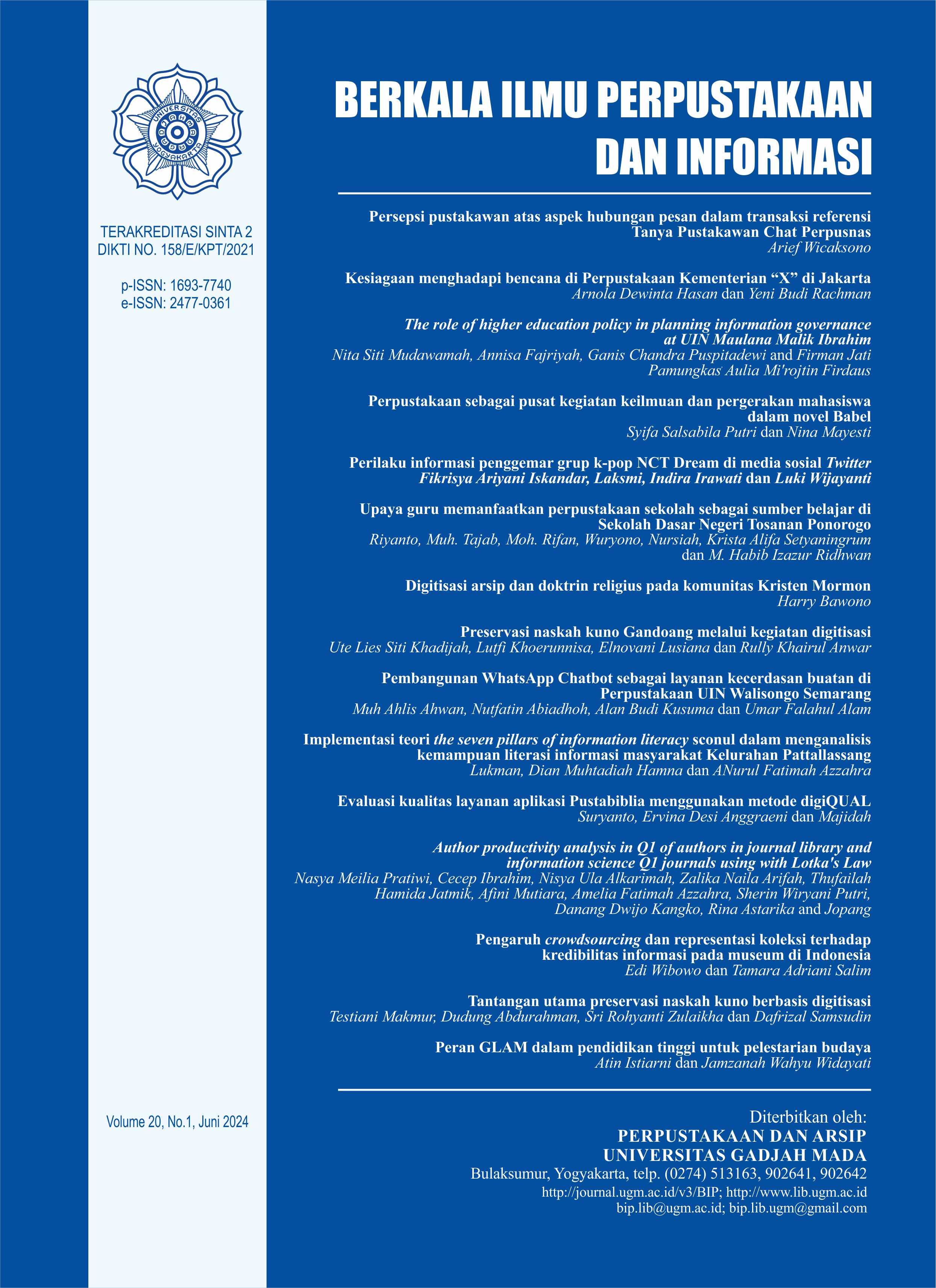Perilaku informasi penggemar grup k-pop NCT Dream di media sosial Twitter
Abstract
Introduction. This paper investigate information behavior of NCT Dream fans (The South Korean Boy Band) on Twitter. Previously, from research perspectives, fan behavior and their information behavior studies have not been discussed deeply. Fans have unique ways to use information by collaboratively creating, organizing, disseminating, and sharing information.
Research Methods. The paper used a virtual ethnographic research method with a qualitative approach. Observations were conducted to explore the exchange of information and interaction between fans with text, images, video and audio among fellow fans. Data was collected by observations, researchers played a role as participants.
Data Analysis. The paper followed the three stages of coding: open coding, axial coding, selective coding.
Results and Discussion. Fans are able to create their own information, which later it is considered as community knowledge, although the source of information is not official. The fans demonstrate collaborative, creative, sharing, and performative activities that engage further with information.
Conclusion. Fan information behavior involves information creation, information organization, information production, and production. Information behavior of fans on Twitter is informal, diverse, and evolving from the model of fan information behavior offered by Price. Furthermore, because fan behavior has shifted to textual productivity, this information behavior model is very helpful in identifying fans on social media. However, crowdfunding appear as one additional behavior inPrice's information behavior model.
References
Baltezarevic, R., Baltezarevic, B., Kwiatek, P., & Baltezarevic, V. (2019). The impact of virtual communities on cultural identity. Symposion, 6(1), 7–22. https://doi.org/10.5840/symposion2019611
Bruns, A. (2014). Beyond the producer/consumer divide: Key principles of produsage and opportunities of innovation. In M. Peters, T. (Athlone C. . Besley, & D. Araya (Eds.), The new development paradigm: Education, Knowledge economy and digital futures (20th ed., pp. 51–65). Peter Lang US. https://doi.org/10.3726/978-1-4539-1136-5
Case, D. O., & Given, L. M. (2016). Looking for Information: A survey of research on information seeking, needs, and behavior. Emerald Group.
Forcier, E. (2022). Everyday onlife practice and information behaviour: A study of media fans in a postdigital age [Dissertation, Swinburne University].
Jenkins, H. (2018). Fandom, negotiation, and participatory culture. In A Companion to Media Fandom and Fan Studies. P. Booth (Ed.). (pp. 11–26). John Wiley & Sons, Inc. https://doi.org/10.1002/9781119237211.ch1
Kusuma, A., Putri Purbantina, A., Nahdiyah, V., & Khasanah, U. U. (2020). A virtual ethnography study: Fandom and social impact in digital era. ETNOSIA: Jurnal Etnografi Indonesia, 5(2), 238–251. https://doi.org/10.31947/etnosia.v5i2.10898
Mirbabaie, M., Brünker, F., Wischnewski, M., & Meinert, J. (2021). The development of connective action during social movements on social media. ACM Transactions on Social Computing, 4(1), 1–21. https://doi.org/10.1145/3446981
Mardiana, L., & Zi’ni, A. F. (2020). Pengungkapan diri pengguna akun autobase twitter @subtanyarl. Jurnal Audience, 3(1), 34–54. https://doi.org/10.33633/ja.v3i1.4134
Nasrullah, R. (2015). Media sosial: perspektif komunikasi, budaya, dan sosioteknologi. Simbiosa Rekatama Media.
Nasrullah, R. (2017). Etnografi virtual: Riset komunikasi, budaya, dan sosioteknologi di Internet. Simbiosa Rekatama Media.
Price, L. (2017). Serious leisure in the digital world: exploring the information behaviour of fan communities [Thesis, University of London]. https://hcommons.org/deposits/item/hc:16513
Seymour, J. (2018). Racebending and prosumer fanart practices in harry potter fandom. In A Companion to Media Fandom and Fan Studies. P. Booth (Ed.). (pp. 333–347). John Wiley & Sons, Inc. https://doi.org/10.1002/9781119237211.ch21
Sumardiono, N. (2022). Aktivisme digital dalam konteks penggalangan donasi fandom BTS (army) Indonesia melalui twitter. Jurnal Komunikasi, 16(2), 113–128. https://doi.org/10.20885/komunikasi.vol16.iss2.art2
Wang, Y., Zhao, H., Lu, Z., & Wattenhofer, R. (2021). Idols that you decide: Understanding the phenomenon and practices of fan-idol crowdfunding. SSRN Electronic Journal, 1(1), 1–22. https://doi.org/10.2139/ssrn.3843034
Williams, M., & Moser, T. (2019). The art of coding and thematic exploration in qualitative research. International Management Review, 15(1), 45–55. http://www.imrjournal.org/uploads/1/4/2/8/14286482/imr-v15n1art4.pdf
Copyright (c) 2024 Berkala Ilmu Perpustakaan dan Informasi

This work is licensed under a Creative Commons Attribution-ShareAlike 4.0 International License.
Berkala Ilmu Perpustakaan dan Informasi is licensed under a Creative Commons Attribution-ShareAlike 4.0 International License.
- Articles published in Berkala Ilmu Perpustakaan dan Informasi are licensed under a Creative Commons Attribution-ShareAlike 4.0 International license. You are free to copy, transform, or redistribute articles for any lawful purpose in any medium, provided you give appropriate credit to the original author(s) and Berkala Ilmu Perpustakaan dan Informasi, link to the license, indicate if changes were made, and redistribute any derivative work under the same license.
- Copyright on articles is retained by the respective author(s), without restrictions. A non-exclusive license is granted to Berkala Ilmu Perpustakaan dan Informasi to publish the article and identify itself as its original publisher, along with the commercial right to include the article in a hardcopy issue for sale to libraries and individuals.
- By publishing in Berkala Ilmu Perpustakaan dan Informasi, authors grant any third party the right to use their article to the extent provided by the Creative Commons Attribution-ShareAlike 4.0 International license.






